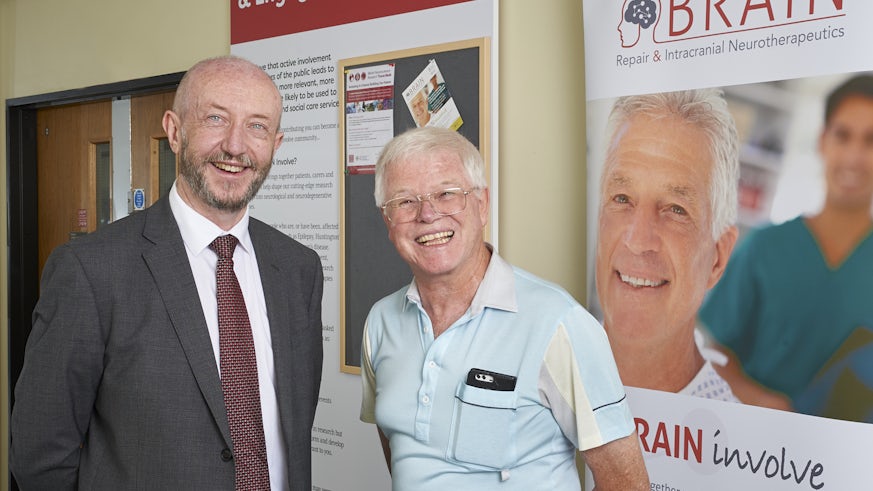In the Spotlight: BRAIN Involve public involvement group
3 November 2017

The Brain Repair and Intracranial Neurotherapeutics (BRAIN) Unit is a research group based at Cardiff University. Funded by Welsh Government via Health and Care Research Wales, the Unit works to develop new therapies for brain diseases.
The BRAIN Unit believes that active involvement with members of the public leads to research that is more relevant, more reliable and more likely to be used to improve health and social care services. If you are interested in playing a role in shaping the Unit’s work, you can become a member of BRAIN Involve.
What is BRAIN Involve?
BRAIN Involve is a public involvement group made up of people who are, or have been, directly affected by neurological diseases such as epilepsy, Huntington’s disease (HD), Multiple Sclerosis (MS) or Parkinson’s disease (PD).
By bringing their personal experiences to the research table, members contribute to the design, development, implementation and dissemination of the Unit’s research around brain repair and developing new therapies for brain conditions.
BRAIN Involve has two dedicated coordinators, Professor Monica Busse and Dr Laura Bunting, who support both members and researchers. The group is also linked to the HCRW Public Involvement and Engagement Involving People Network, which offers a range of free training and support events to help members gain the most from their experience.
Since inception two years ago, the group has recruited 14 members with two people even becoming co-applicants on research grants in HD and MS.
Pioneering research and treatments
A big part of public involvement is helping to shape and inform not only research, but also the pioneering treatments delivered by the BRAIN Unit.
In March 2016, the Unit’s Professor William Gray performed the first ever robot-assisted epilepsy procedure in Wales with patient Denise Casey, who was diagnosed with epilepsy when she was 31 and suffered up to six fits every day for the past 20 years.
With the robotic arm, created by technology company Renishaw, it took Professor Gray 55 minutes to accurately identify and operate on the epileptogenic zone in a procedure that would normally take four hours. Denise, who has not suffered any seizures since her two procedures, recently hailed the neurosurgery as ‘wonderful’ in a BBC Wales interview.
BRAIN has also been awarded research funds to undertake the first trial in Wales assessing the impact of neural transplantation in people with Huntington’s’ Disease. BRAIN Involve input from the outset will help support and develop this vital trial to understand the possible treatments for this currently incurable and devastating condition.

Case study: Peter Roberts
Former deputy head teacher Peter Roberts had been shaving in the bathroom when he suffered his first epileptic seizure and his wife Christine found him lying unconscious on the floor. Although Peter made a good recovery, he went on to suffer four more epileptic fits and quickly began to realise the value of providing patient insight for epilepsy research.
Now BRAIN Involve members, Peter and Christine delivered a talk at the Cardiff University Brain Research Imaging Centre (CUBRIC) to share their personal understanding of epilepsy and stress the importance of research into neurological conditions.
“My original motivation for getting involved with BRAIN Involve was actually my mother’s experience of Parkinson’s disease,” Peter explained.
“In the later stages of her life, my mother suffered greatly with PD – the last three years of her life were hell. This is one of the many reasons why the BRAIN Unit’s research is so vitally important. If there is anything at all I can do to support or progress Cardiff University’s treatments in PD or epilepsy – I will do so!”
How do I get involved?
As a member of BRAIN Involve, core activities may range from attending meetings with the research team, writing/reviewing research grants, or helping to organise, chair and attend meetings with other members.
“The importance of public involvement in our neuro-research and development of novel therapies cannot be overstated,” said BRAIN Unit Manager, Laura Bunting.
“Being a member of BRAIN Involve is not about taking part in research, but about using your experiences to help inform and develop research ideas and projects that are relevant to your condition.”
If you are interested in playing a role in shaping neuroscience research, contact the BRAIN Unit team on brainunit@cardiff.ac.uk, or visit BRAIN Involve.


